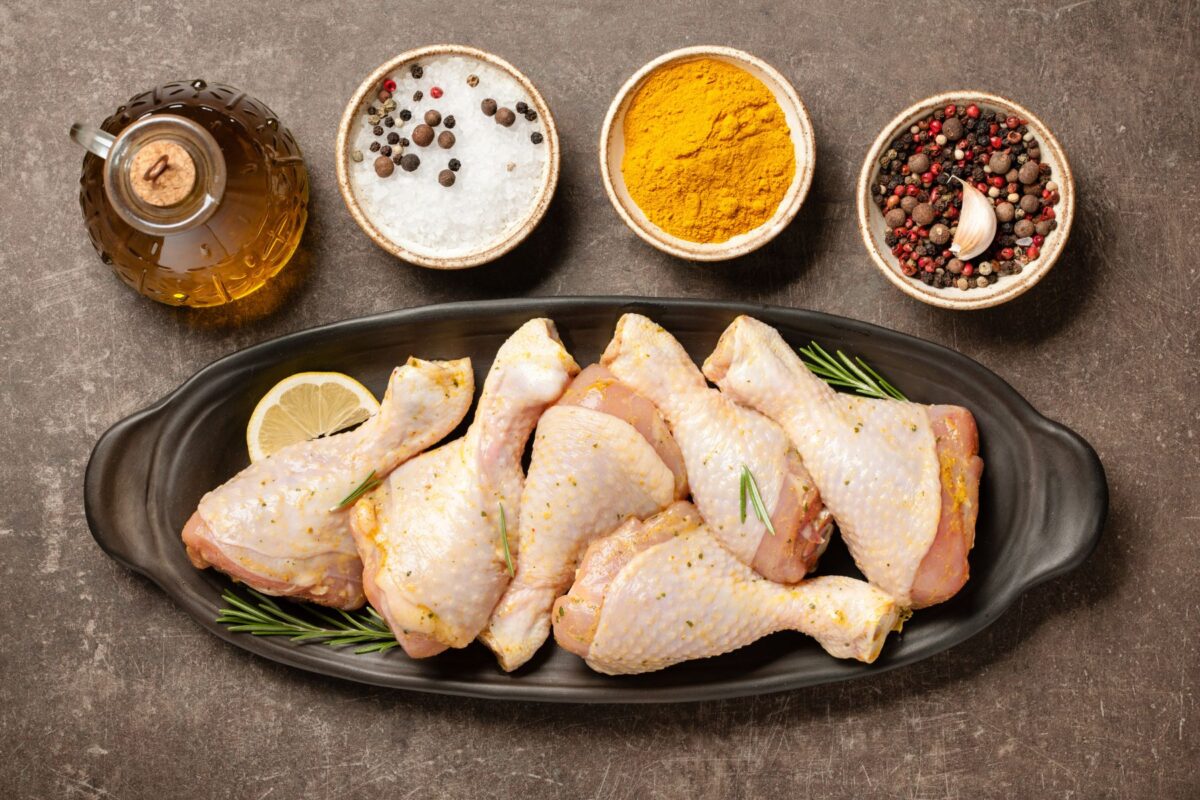Photo by ff-photo On Envato Elements
Marinades are a simple and efficient method of providing extra flavor to meat and poultry before cooking.
This technique is suitable for a variety of cooking styles, such as grilling, pan-frying, broiling, and searing. We offer a few tips and tricks to help you maximize the flavor of your marinade.
A Threefold Challenge
A careful balance is needed when creating an effective marinade, and it should consist of three main components – acid, fat, and seasoning.
Acidic ingredients, such as wine, vinegar, citrus juice, buttermilk, or enzyme-rich fruits like papaya or pineapple, work to soften the meat’s surface, allowing it to absorb flavoring.
They also help to reduce the carcinogenic effects of grilling and roasting by performing the same function as ‘free radicals’ for meat.
However, a small amount should be used to ensure the best results. Fat, which can be provided by olive oil, duck fat, coconut milk, or yogurt, moistens the meat, adds flavor, and helps transport fat-soluble flavor compounds from herbs and spices.
Seasonings give flavor and often help with caramelization. Common choices are spices, herbs, soy sauce, sugar, garlic, onions, celery, and chiles. When used with the right ratios, acids, fats, and seasonings not only work together but also enhance each other’s effects.
A Narrative of Tenderizing that is Tall
A longstanding culinary misconception is that marinating tenderizes tough cuts of meat. To truly soften the muscle tissue and collagen fibers, the meat must be broken down.
While acids contained within marinades can have a slight impact on the collagen and muscle tissue, the effect is only on the surface.
Furthermore, leaving the meat in an acid-based marinade for too long will make the outer layer of the meat soft rather than tender.
Therefore, marinades should only be used for a brief period and if one is looking for a tender cut, we suggest bringing or picking a naturally tender cut.
Preserving
It is essential to use a covered, non-reactive container when marinating meats and poultry. Utilization of aluminum containers or foil should be avoided, as it will lead to a chemical reaction that will cause discoloration and impart a metallic or bitter flavor.
A glass or Pyrex bowl that is tightly sealed with plastic wrap is ideal for smaller cuts such as tenders, while a shallow baking dish should be used to marinate larger items like steaks, chops, and breasts.
For whole roasts or birds, a large re-sealable zipper bag (with the air removed) is recommended. For food safety reasons, it is best to marinate in the refrigerator. Although, the meat can be taken out up to an hour before cooking to remove the chill.
Be Original!
Try something new in your cooking routine by adding a marinade to your preferred meat before preparing it with grilling, pan-roasting, or broiling.
Marinating is an amazing way to experience global cuisine without having to learn unfamiliar cooking techniques. You can experiment with flavors that are foreign to you and pique your interest.
Take, for instance, if you like…
- To try a Thai marinade, consider using coconut milk, galangal, lemongrass, purple basil, or chiles.
- For an Indian marinade, experiment with yogurt, lime juice, turmeric, coriander, curry, or mustard seeds.
- For a Japanese marinade, play around with sake, mirin, ginger, dried shiitakes, or shiso.
- To try a Mexican marinade, use lime, garlic, cilantro, cumin, or achiote paste.
- To try a Vietnamese marinade, use fish sauce, rice vinegar, sriracha, green peppercorns, or anise seed.
- For a North African marinade, experiment with lemon juice, honey, onion, cardamom, fenugreek, cinnamon, or allspice.
Here are some helpful suggestions:
Marinades are ideal for thin cuts of meat such as single-cut chops, steaks, breasts, and small birds, as well as for chunks or slices used for kabobs, satays, and stir-fry.
- For thicker cuts of meat or large whole birds, try using brining or dry rubs instead.
- NEVER re-use a marinade that has been in contact with raw meat as a sauce. If you wish to have a sauce that is compatible with the marinade, set aside some beforehand and reduce over low heat in order to thicken it.
- NEVER marinate meat at room temperature for more than one hour.
- Marinades are great for grilling, but be aware of potential flare-ups.
- Adding sugar and honey to a marinade provides flavor and aids in caramelization, thus adding an extra layer of taste.

